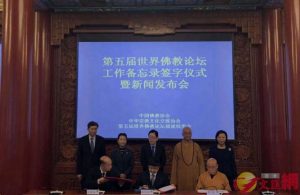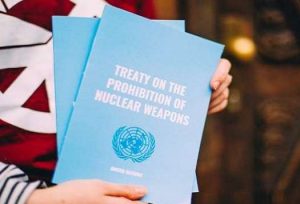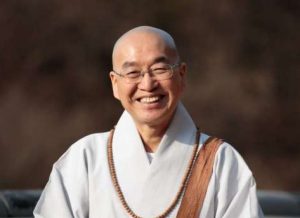
The Korean Seon (Zen) master Venerable Pomnyun Sunim (법륜스님) wears many hats: Buddhist monk, teacher, author, environmentalist, and social activist, to name a few.* As a widely respected Dharma teacher and a tireless socially engaged activist in his native South Korea, Ven. Pomnyun Sunim has founded numerous Dharma-based organizations, initiatives, and projects that are active across the world. Among them, Jungto Society, a volunteer-based community founded on the Buddhist teachings and expressing equality, simple living, and sustainability, is dedicated to addressing modern social issues that lead to suffering, including environmental degradation, poverty, and conflict.
This column, shared by Jungto Society, presents a series of highlights from Ven. Pomnyun Sunim’s writings, teachings, public talks, and regular live-streamed Dharma Q+A sessions, which are accessible across the globe. The following teaching was given in New York City on 18 September 2023. This article is the 18th in a special series taken from Ven. Pomnyun Sunim’s Dharma tour of Europe and North America—his first overseas tour since the pandemic. Titled “Casual Conversation with Ven. Pomnyun Sunim: Come Talk about Life, Wisdom, and Happiness,” the Dharma tour ran from 1–22 September 2023, taking in 21 cities: six in Europe and 15 in North America.**

•••
A fundamental solution to the climate crisis
Ven. Pomnyun Sunim: When plastic was first introduced, many people welcomed it as a durable new raw material that greatly improved our lives in terms of convenience. However non-biodegradable microplastics are beginning to pose a significant threat to humanity that is almost as serious as the climate crisis. Microplastics do not decompose, so they flow into the oceans in the form of tiny particles that are invisible to the naked eye. Marine animals ingest these particles, which accumulate in their bodies. When humans consume these fish, the microplastics enter our bodies as well. The long-term health consequences of this accumulation of microplastics in the human body are still unknown.
Just as the 20,000 components that make up a typical car are intricately connected according to a detailed design to allow the car to move, so too the intricate interconnectedness of all beings in the universe allows many forms of life to thrive. The climate crisis, brought about by human overconsumption, is leading to the extinction of numerous species and is a stark warning of the impending threat of human extinction.
Although technology can be helpful in these crisis situations, it can only alleviates symptoms and does not offer a fundamental cure. The fundamental treatment is to reduce consumption. But can we, who are addicted to consumption, really reduce our consumption?
Unless we reduce consumption, humanity is inevitably headed toward extinction. It’s a matter of time only—whether it takes 50 years or 100 years. Therefore, those who indulge in consumer luxuries and overconsumption are not to be envied but can be considered adversaries of humanity. In this era of climate crisis, your values need to undergo significant changes. We must adopt the perspective that those who over-consume are enemies of humanity, not people to be envied, and that we need to work toward reducing consumption.
Living a simple life and finding satisfaction there can lead individuals to contentment, making them happier without constantly craving more. Additionally, as economic disparities decrease, the overall happiness of society can improve. In this way, we can collectively work toward overcoming the climate crisis.
The person who first presented this path and set an example by walking it is what I consider to be the Buddha. He willingly gave up a position of potential kingship, forsook a life of wealth and abundance, and instead ate only alms, wore cast-off clothing, and slept under trees. Despite this, he found happiness within himself and led others onto the path of happiness. The teachings of the Buddha were not about praying for blessings in order to reach a better place after death; they were about showing humanity a new path to follow—especially relevant in the era of the climate crisis. In this regard, I like to call the Buddhadharma “the ancient path for the future” because it teaches us how to live a life free from suffering.
After sharing his opening address, Ven. Pomnyun Sunim received questions from the audience.
Connecting with my colleagues
Q: I am a Korean who has been living in the United States for 21 years now. Working with Americans at my job often feels challenging. I frequently feel disheartened by my inability to communicate in English as fluently as someone born here. I also worry that my coworkers might ignore me. When company meetings don’t go as planned or my opinions aren’t well-received, I tend to automatically blame my language limitations, which undermines my confidence. I got married here and I consider the US to be the foundation of my life. Assuming that I won’t be returning to Korea in the foreseeable future, how can I approach this situation with a mindset that will help me overcome the distress and challenges?
Ven. Pomnyun Sunim: Do you have children?
Q: No, not yet.
Ven. Pomnyun Sunim: If a child is born in the United States, would there still be language issues if they physically look Korean? Or would there not be any language issues?
Q: There would not.
Ven. Pomnyun Sunim: However, you spoke Korean in Korea before coming to the US, so there might naturally be some language limitations. Similarly, someone from Gyeongsang Province may continue to use their regional dialect even after living in Seoul for a long time—isn’t this something that it happens?
Q: It happens.
Ven. Pomnyun Sunim: Even within the same country, such language limitations can arise. For instance, if a North Korean or someone from Yanbian Korean Autonomous Prefecture in China were to come and live in Seoul, would their regional dialect and accent completely disappear just because they’ve lived there for 20 years?”
Q: It won’t go away.
Ven. Pomnyun Sunim: When you emigrate at a young age, you can usually overcome language limitations fairly easily, but if you emigrate as an adult, it can be challenging to fully overcome such language limitations. Similarly, even if you have lived in the US for a long time, the fact that you came here as an adult means that your accent may not change significantly. So shouldn’t you accept this to some extent and live with it? There may not be any other viable option.
Q: It seems like I have high expectations for myself.
Ven. Pomnyun Sunim: Someone who comes to the US as an adult after living in Korea and then expects to speak English fluently like a native-born American can be considered overly ambitious. This is because they are ignoring a natural reality, which leads to constant frustration. If you’ve immigrated to the US, you should be prepared to accept such drawbacks to some extent.
Of course, if there is discrimination against your legally protected rights, you should consider taking legal action, as US law prohibits discrimination. However, facing some degree of minor disregard due to a lack of fluency in a language may not be easily accepted as the basis for a lawsuit. You may need to be willing to tolerate such minor inconveniences to some extent.
Let me provide another example. Suppose I work at this company, and let’s say there’s a need for a new entry-level employee within the department. Now, if we have Korean immigrants, Vietnamese immigrants, and Mongolian immigrants, and assuming that the qualifications of the Korean, Vietnamese, and Mongolian immigrants are equally impressive, whom do you think human resources would be more inclined to recommend? Would it be someone like me, another Korean, or perhaps someone who attended the same university as me, a fellow alumnus, or even someone from my hometown? Isn’t it relatively natural for human psychology to lean in that direction? Understanding these human dynamics, one might have to accept some minor disadvantages. As the saying goes, birds of a feather flock together. While legal action should be taken in cases of clear discrimination, it’s also important to acknowledge the presence of such natural inclinations when dealing with immigrants.
So there are two possible approaches: first, when qualifications are similar, you may need to accept some disadvantages; second, to surpass such obstacles, you should strive to improve your own skills. If you find yourself lacking in language proficiency, you can compensate by being exceptionally friendly and helpful, which can also earn you points.
Indeed, if you can’t communicate effectively, aren’t friendly, and lack skills, you may find yourself falling behind in a competitive environment. If being friendly doesn’t come naturally, then it’s essential to work on improving your skills. If skill-enhancement is challenging, then being kind, smiling, and having a positive attitude while being receptive to tasks and responsibilities can be a viable approach. If none of these options are appealing, there’s always the choice to return to Korea. Ultimately, the path forward depends on your own preferences and capabilities.
Q: I can’t leave my husband behind.
Ven. Pomnyun Sunim: You can take him to Korea. Is your husband American?
Q: Yes.
Ven. Pomnyun Sunim: So should you take your husband to Korea to let him experience some discrimination? That way, he might understand your feelings of being discriminated against in the US, don’t you think? (Audience laughter)
Expecting an immigrant to receive the same treatment as a local resident is somewhat unrealistic. Instead, it’s your children who are likely to avoid discrimination because they’ll be learning the language and assimilating into the culture from a young age. As an immigrant, however, it’s reasonable to accept that you may need to tolerate some disadvantages. It’s important to have a perspective which acknowledges that you might need to endure minor inconveniences rather than just seeking the benefits.
Q: Thank you.
After taking questions, Ven. Pomnyun Sunim concluded by sharing a perspective on practice.
Speak and listen lightly
Ven. Pomnyun Sunim: People can sometimes express their true feelings, but there are also instances where their words and thoughts don’t align. You’ve all experienced moments when your thoughts and feelings diverge. But we can only truly understand others through their words. Going beyond words to really connect with someone is a challenging endeavor. Even understanding words properly can be difficult.
When I was young, my mother used to say, “No matter how scary something is in this world, there is nothing scarier than not speaking up.” For example, when you lose something and it can’t be found—if that thing could speak, then we wouldn’t have situations where we can’t find it. When you call the name of an object and it answers with a “yes,” you can quickly find it. Similarly, when someone doesn’t speak, you can’t know what’s in their heart. Not speaking is a frightening thing. Even if you do speak, you can’t fully know the other person’s heart, but if you don’t speak it becomes even more unknowable. In a relationship with a spouse who shares their life and thoughts with you, it’s important to express things lightly. This doesn’t mean saying something like, “I can’t live because of you.” Instead, it means expressing things lightly, such as, “It’s a bit disappointing to hear you say that.”
At times like this, you shouldn’t assume that the other person must unquestionably accept what you say. One significant reason why people find it difficult to express themselves to others is because they operate under the assumption “if I speak, you must accept it.” They hesitate to speak because they fear the other person won’t accept it.
Whether or not another person accepts my words is their freedom. Speaking is your freedom. You can speak lightly, and even if the other person doesn’t accept it, you can think, “Okay, that’s your freedom,” and this mindset can make it easier for you to speak.
I tend to speak relatively honestly because I believe it’s your freedom whether or not you accept my words. For instance, during Q&A sessions, do the people who ask me questions actually follow my advice? Not always! If I were to think, “They won’t follow what I say anyway, so why bother answering,” it would make me feel bad, and I might even become unwilling to respond. Asking is their freedom. Responding is my freedom. Whether or not they act on my response is also their freedom. Yet we often interfere too much with other people’s freedom.
Don’t close the door
If you need clothes, you might simply mention to your husband while passing by a store, “I need this clothing, can you buy it for me?” However, the reason why people hesitate to say this is that they are concerned about being considerate. They keep looking for signs and hesitate, thinking, “What if he doesn’t agree?”
When you make the request and he says, “No,” you can respond with “Alright.” If you still want it, you can try saying, “What if we buy it?” If he says, “I said no,” you can reply with “Okay.” However, many people quickly become upset and say, “Fine, I will never ask you to buy something again.” In the end, who loses? It’s only you. This can cause the relationship between spouses to deteriorate; you don’t get the item and you lose the opportunity for future cooperation.
You should always keep the door of opportunity open in life. Even if your sibling steals money, it’s better not to cut off the relationship immediately but to keep the door open and live that way. Maintaining emotional openness even with people you dislike can broaden your human relationships. If you keep closing the door, you may end up isolated and your life can become a prison. This isn’t something you do for the sake of the other person. When you make sure your door is always open, you become more free. I encourage you to try it; it’s good for everyone.
I hope that you all live a little lighter and freer with this perspective.
* Buddhist Monk Ven. Pomnyun Sunim Awarded the 37th Niwano Peace Prize (BDG)
See more
Pomnyun
Jungto Society
JTS Korea
JTS America
International Network of Engaged Buddhists
Related features from BDG
Are You Happy?
The Path without Suffering
Be Free from Suffering
Living a Life without Suffering
Live Life Lightly
Prostrating as a Part of Buddhist Practice
Suffering and the Significance of Insignificance
Treasure the Present and Value Your Own Life
Free Will and Freedom from Suffering
Do Not Sacrifice Later for Now
Begin Life Now
Becoming the Master of Your Own Life
You Are Alive Today
Everyone Has the Right to be Happy
Personal Action to Mitigate the Climate Crisis
Awareness, the Beginning of Change
How to Live Life More Freely
Related videos from BDG
Dharma Q+A with Ven. Pomnyun Sunim
Wisdom Notes from Ven. Pomnyun Sunim






















